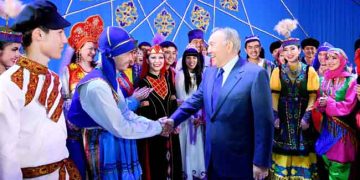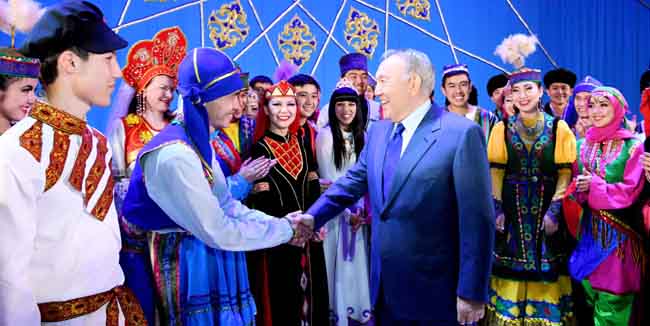NHT EXCLUSIVE
Kazakhstan, like Pakistan, is an inter-confessional and multi-ethnic state (130 ethnic groups, 17 religious confessions live in Kazakhstan). In order to develop a multi-ethnic and multi-confessional society, as well as the political system of the country, strengthening the interests of all ethnic groups, ensuring strict observance of the rights and freedoms of citizens, regardless of their ethnicity, the Assembly of the Peoples of Kazakhstan (APK), established on March 1, 1995, was established. The idea of creation was announced in 1992 at the first Forum of the peoples of Kazakhstan.
The legal status of the Assembly is determined by the special Law “On the Assembly of the People of Kazakhstan”, which regulates the formation procedure, structure and governing bodies, defines the goals, main tasks and powers of the ANC.
The activities of the structure are aimed at implementing the state national policy to promote “public harmony and national unity” in the country, ensuring socio-political stability and increasing the effectiveness of interaction between state institutions and civil society in the field of interethnic relations.
The Assembly includes authoritative public figures, politicians, deputies of parliament and regional maslikhats, businessmen, journalists, creative and scientific intelligentsia, elders, etc. The body’s activities are based on the principles of patriotism, civil and spiritual and cultural community of the ethnic groups of Kazakhstan with the consolidating role of the Kazakh people.
The key activities of the APK, in addition to the development and implementation of state policy to ensure public harmony and national unity, are to promote the development and popularization of the study of the state language and other languages of the people of Kazakhstan, monitoring the sphere of interfaith relations; participation in the socio-political examination of draft laws on interethnic relations; providing organizational and legal assistance to ethno-cultural associations; assistance in the development of the sphere of charity, mediation, etc.
Regional APKs have also been established in the cities of Nur-Sultan, Almaty, Shymkent and regions.
The supreme body of the structure is the session of the Assembly, which is held by the President of the country. All its decisions are obligatory for consideration by state bodies and civil society institutions.
It was during the session that the Head of State for the first time announced on April 29, 2022 the need to implement political reforms in the country, introduce amendments and additions to the Constitution of Kazakhstan. One of the features of the Assembly is the representation of the interests of ethnic groups in the highest legislative body – the Parliament of the country as a guaranteed representation. The Assembly elects five deputies of the Mazhilis of the Parliament. The elected deputies of the Assembly represent its interests as the totality of the interests of all the nationalities of the country.
The working body is the Secretariat of the Assembly of the People of Kazakhstan in the structure of the Presidential Administration as a separate department.
It should be noted that public institutions play an important role in the activities of the APK, ensuring the correct functioning of the regulatory field. Thus, the Assembly of the People of Kazakhstan includes the Scientific and Expert Council of the APK, the Club of Journalists and Experts on Interethnic Relations in the APK, the APK Foundation Public Foundation, the Tildaryn Methodological Center for Innovative Language Teaching Technologies, and the Association of Entrepreneurs of the APK.
The activities of the Assembly are associated with ensuring equal opportunities for ethnic groups in the educational process. There are 88 schools in the republic, where education is conducted entirely in Uzbek, Tajik, Uighur and Ukrainian.
In 108 schools, the languages of 22 ethnic groups of Kazakhstan are studied as a separate subject. In addition, there are 195 specialized linguistic centers where not only children but also adults can learn the languages of 30 ethnic groups.
The resource, cultural and methodological center of ethno-cultural associations, as well as project offices and places for the formation and dissemination of ideas of unity, interethnic harmony are the Houses of Friendship. There are 40 such Houses of Friendship in the country, as well as 174 Sunday schools, including 124 groups for teaching the state language. The institution also created conditions for the development of languages, traditions and cultures of the Kazakh ethnic groups in accordance with international standards.
In addition to the Kazakh and Russian theaters, there are four national theaters in the country – Uzbek, Uighur, Korean and German.
The APK also promotes the Club of Journalists as a permanent platform that contributes to the consolidation of media efforts in strengthening tolerance and maintaining public harmony and national unity. The club develops recommendations for the media on covering interethnic issues, actively promotes the topics of Kazakh patriotism, respect for the traditions of ethnic groups in the information field, and promotes the study of the state language. A Club of Foreign Friends of the APK has also been created, which is visited by friendship ambassadors from France, Azerbaijan, Germany, Uzbekistan and the Russian Federation. Negotiations are underway on cooperation between the Club and the United States.
As part of achieving its goals, the APK is engaged in a number of other activities – awarding public figures, scientific and expert councils, etc.
A special place in the sphere of ethno-cultural relations in the Republic of Kazakhstan is given to support for the development of information and communication resources of ethno-cultural associations.
More than 35 national newspapers and magazines are actively working in the information field. The six largest ethnic national newspapers operate with state support. Newspapers and magazines are available in 11 different languages, radio programs in 8, TV shows in 7 languages.
Over the years of independence, the APK has proved that it is a unique institution of intercultural and interethnic dialogue, an effective tool for public diplomacy, interaction between the state and civil society. Since the establishment of the Assembly of the People of Kazakhstan, the organization has achieved the consolidation and integration of ethnic groups on the basis of Kazakh identity and citizenship.





